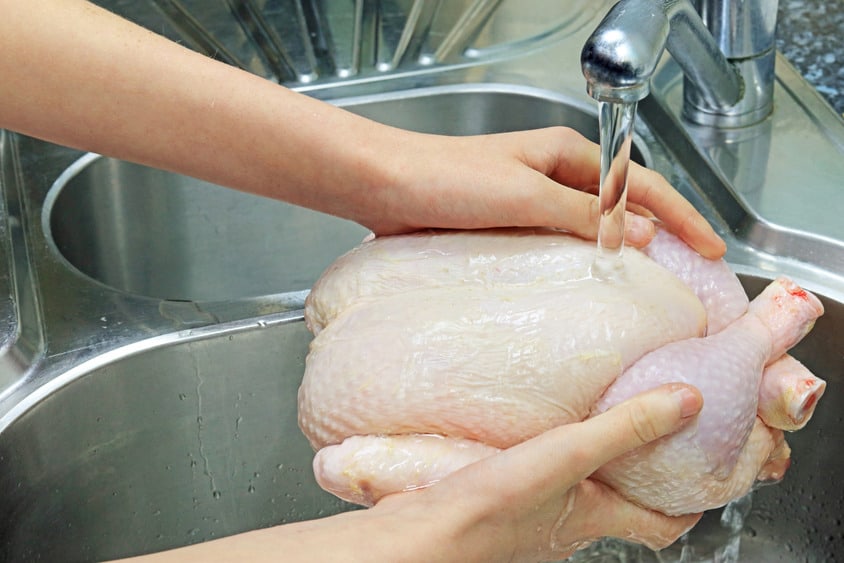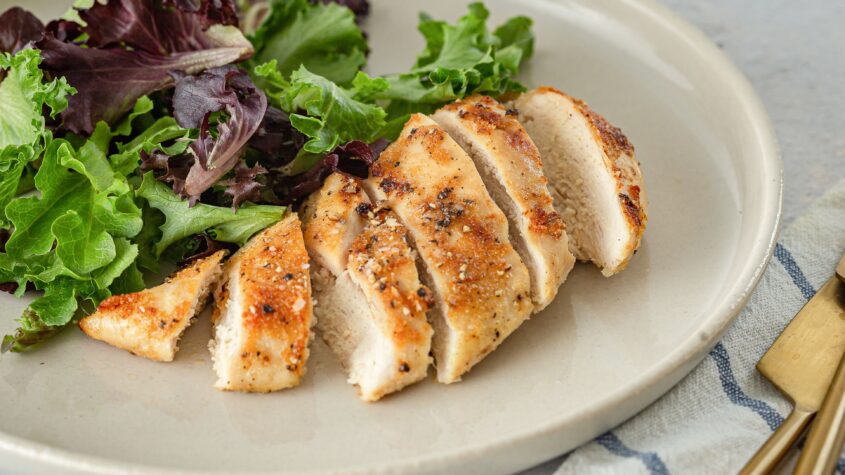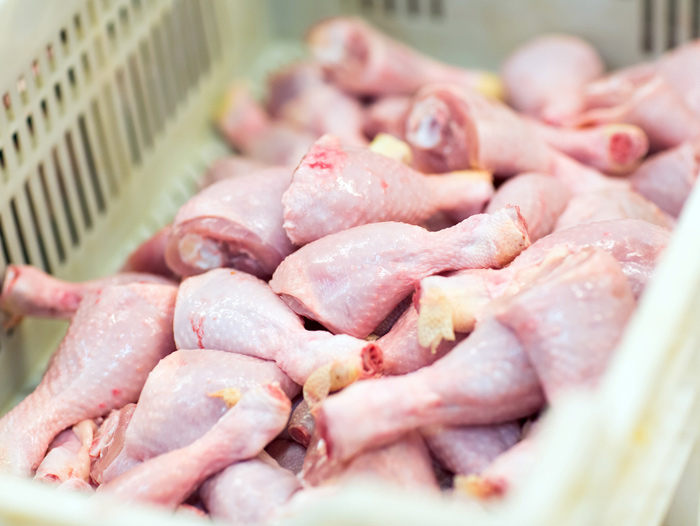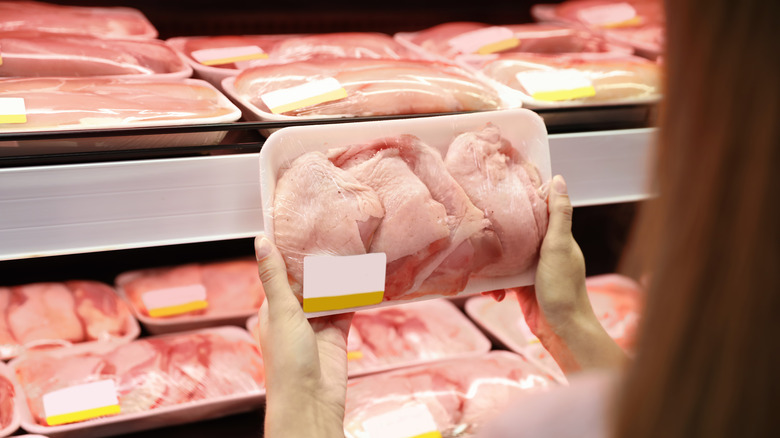
How many of you all had an anxiety attack after realizing that you have left the chicken on the kitchen countertop instead of storing it in your refrigerator? This is a common mistake committed by most of us after returning from the grocery store.
Now, the question arises if the chicken is safe to consume as it has been unrefrigerated for quite a few hours. Mentioned below are some of the rules or guidelines to be kept in mind while handling raw chicken meat, frozen or thawed chicken meat, as well as leftover cooked chicken meat.
Guide For Raw Chicken Meat
Refrigerating the raw chicken meat at the earliest is of utmost importance for a healthy meal and life. One should never miss ensuring the safety of chicken meat consumption.
Raw Chicken At Room Temperature
Temperature plays an important role in maintaining the freshness of the chicken meat. In fact, it also has a vital impact on prolonging its shelf life. Incorrect temperature can accelerate bacterial growth on the meat such as B – Salmonella, and other pathogens. This results in food poisoning.
Harmful bacteria produce toxins that are harmful to your health. Hence, you need to be watchful over the room temperature. Always keep in mind that raw chicken can sit at room temperature for a maximum of two hours before being refrigerated.

Do not prepare the chicken meat if it has been unrefrigerated for more than two hours. You must understand that the meat is no longer safe to consume and should be discarded.
Summer reduces the shelf life of raw chicken meat, as the temperature is too hot to maintain the freshness of the meat. For those who do not know, your family is at a higher risk of contracting foodborne diseases through chicken meat, if you are residing in a warmer area as compared to a moderate or cooler region.
To maintain the safety of the raw chicken meat while it is placed outside the fridge, your room temperature should not be higher than 72° Fahrenheit.
Raw Chicken With Prolonged Air Exposure
Keep in mind that temperature is just one of the many factors that help maintain the freshness of the meat. Air or oxygen, in particular, contributes to the bacteria’s growth, as the microorganism requires oxygen to thrive.
According to medical sources, a portion of raw chicken that is exposed to oxygen is likely to contain a bacteria density which is two-fold the amount of properly stored meat.
Medical professionals have also warned that the flow of air over the chicken spoils the meat, irrespective of the raw chicken meat being refrigerated. Canning, freezing, and dehydration are, therefore, the best ways to preserve raw chicken meat.
Guide For Thawed Chicken Meat
Defrosting or thawing the chicken involves increasing its temperature, until it is no longer in a frozen state. In short, thawed chicken meat indicates that the chicken is ready to be cooked.
The ideal temperature for the bacteria to grow on chicken meat ranges from 40˚F to 140˚F. While you’re in the process of thawing chicken meat, it is best to let it sit in the refrigerator, and not in the kitchen.
Do remember to let the meat sit on a plate that’s placed on the bottom shelf of your kitchen refrigerator to avoid any spillage of juices or remaining blood of the chicken if any. This practice will prevent cross-contamination of other food items that are present in the fridge.

Allowing frozen chicken meat to sit in the fridge for a while helps to maintain the texture without the meat becoming waterlogged. Avoid thawing chicken pieces by submerging them in hot water.
While this may seem to be an easier and faster way to defrost the chicken, it is considered the riskiest way. Chicken ought to be cooked as soon as it is thawed if you want to relish the taste and lusciousness of the meat.
If you want to prepare a delicious meal for the next night, remember to transfer the frozen meat from the freezer to the fridge, the night before. If you change your mind about cooking the meal, do not panic about the chicken meat.
Safely transfer the raw chicken back to the freezer from the fridge. However, note that the process of defrosting and refreezing the chicken meat can affect the quality and taste of the meat.
You can also consider skipping the thawing process and directly cook the frozen chicken. This will reduce your efforts while cooking the meat. You do not have to bother to keep the chicken meat out of the freezer.
The only drawback is that the chicken meat will take a little bit longer to cook on the stovetop. Be mindful of cooking the chicken immediately after it has been thawed in the microwave, as the danger of bacterial growth accelerates. The food safety moves into the danger zone sphere if you do this.
Guide For Cooked Chicken

Like the raw chicken meat, cooked/fried chicken meat should not sit out of the fridge for more than two hours. If the cooked or fried chicken is placed out of the refrigerator for a period of two hours with a surrounding temperature of 40°F to 140°F, the food is labeled to be in the danger zone.
Such food is considered unsafe, and hence, should not be consumed as it will pose a risk to your health. Furthermore, cooked or fried chicken meat placed at a room temperature of more than 90°F should only be left out for a maximum of one hour.
Meat served within a warm environment is highly likely to lead to health problems such as food poisoning or indigestion. You can minimize the risk of any sort of foodborne illness by refrigerating the cooked/fried chicken food as soon as you can.
Also, note that chicken salads can last for a maximum of three to four days in the fridge. Be aware that not only cooked chicken, but any form of cooked meat should not sit out of the refrigerator for more than two hours.
While you are at an outdoor picnic, you ought to be careful about the consumption of the cooked or fried chicken in terms of the safety time frame and surrounding temperature.
Things To Be Kept In Mind/Safety Tips
Usage Of Chafing Dishes
If the chicken meat is not kept cool in chafing dishes such as placing it in ice boxes or coolers, you should consider the meat to be unsafe for consumption. This is mainly because the meat was placed on the table for more than two hours.
Placement Of Raw Meat In Coolers

During your grocery shopping, try to carry a cooler with some ice packs if it is an extremely hot day. Place your chicken in this cooler so that the chicken meat remains fresh till you reach home. Once you reach home, quickly place the raw chicken meat in your refrigerator. This rule applies to all raw meat such as fish, pork, mutton among others.
Understanding Room Temperature
Since we understand that temperature affects the longevity of the chicken, one must be vigilant of the existing room temperature before leaving the raw meat for too long on the kitchen countertop.
Storing In The Refrigerator
Develop a practice of placing the raw chicken meat immediately in the refrigerator once you arrive home from your grocery run. This practice can help you save the chicken meat from being wasted and discarded from your pantry.
Unnecessary Rinsing Of Meat
You must avoid unnecessarily and repeated washing of the raw meat as this practice can encourage bacterial growth in the meat. In case of any dirt or debris found on the raw chicken meat, you can clean it with a moist kitchen paper towel.
However, do not forget to thoroughly wash your hands while handling raw chicken meat to prevent the spread of microorganisms.
Buying Practice
Try to avoid purchasing or sourcing raw chicken meat from marketplaces or supermarkets where the meat has already been on the counter for a long period of time.

Always ensure the quality of the chicken before purchasing, storing as well as cooking the meat. Remember that cooking the chicken meat for longer hours does not necessarily mean that you are getting rid of all the bacteria that is present in the meat.
Conclusion
Raw as well as cooked chicken meat can harbor a lot of harmful bacteria. For a healthy life, the two-hour chicken rule is the most important directive while storing and preparing the chicken meat.
Moreover, choose a chicken meat packet with a longer expiry date if you do not intend to cook the meat at the earliest. Most importantly, if the chicken meat is of poor quality, your final cooked meat will be a letdown irrespective of your cooking efforts. You should always consult a nutritionist or a food expert to understand the guidelines on food nutrition, safety as well as handling practices pertaining to chicken meat.











